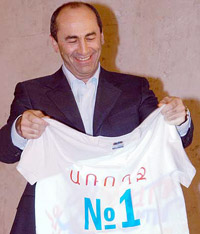So, it turns out that Armenia will receive approximately 236 million dollars in the framework of the “Thousand Year Battles” project. This amount is a pretty large amount for our country; as a matter of fact, it is more than we expected. Of course, the president of the “Thousand Year Battles” corporation has sent a letter to president Kocharyan where he states the steps needed to be taken by Armenia in order to receive that amount (if those steps are not taken, then the project may be announced invalid). Basically, they treated us with the same respect that a teacher treats a lazy student-giving us a “three” (C grade) conditionally before the end of the semester and warning us that if we didn’t work harder, “we would stay in the same grade and repeat the course.” In reality, it is rare to see something like that happen. The U.S. perfectly understands that it is useless to think that the present day Armenian authorities will “fight against corruption” and “govern the nation fairly”, and if they are promising us a large amount of money despite the situation, then that means that they have more pragmatic reasons for doing that.
Was it by chance that the U.S. promised to provide us with 236 million dollars just when Russia finally decided to raise the prices of gas for Armenia? As a matter of fact, Russia made us realize that we, really are a “fore post”, but we are not Belarus. In order for us not to decide to be more pro-Russian than Belarus for the sake of the cheap gas price, a “compensation” was made to us at the right time. As to whether or not it will be possible to improve Armenian economy with 236 million dollars (especially since it is not encouraged to develop economy with this amount), that is a different story. In other words, can we consider the 236 million dollars and the cheap gas price as equal? They are equal in some way because, in either way, we were not able to develop economy with a cheap price for gas. In general, economic development in Armenia faces two obstacles: lack of communications and the high level of corruption. Neither the cheap gas price nor the large amounts provided by the “Thousand Year Battles” corporation can solve either one of these problems. But will Armenian authorities really manage to take some of the steps foreseen by the “Thousand Year Battles” corporation? It is absurd to expect any steps taken for the fight against corruption. The people responsible for fraud during the referendum will not be punished. But we can say that there is progress in the freedom of speech and the debates with the opposition. The opposition of Armenia has never been as weak as it is now, so the authorities should not worry about any future attempts for revolution. In other words, they can feel themselves democratic.
As a matter of fact, Gagik Tsarukyan looked at this in an interesting way and expressed his opinion by saying that the 2007 parliamentary elections are going to be fairer. Basically, since the opposition is very weak and the authorities are not going to have any problem with confronting the opposition, the authority forces are going to go against each other and each person is going to control himself by using contacts. It is one thing when the opposition that does not have any contacts tries to control the elections, and another when the individuals that have contacts control one another knowing perfectly that each individual is going to try fraud by using the other.
In a word, the inter-political situation of Armenia in 2007 may be pretty interesting. All forces of the authorities can (and have already started) not only divide the people who have been “left alone” as a result of the passivity of the opposition, but also, the opposition leaders themselves. The interesting thing is that if that “division” is fair, will it be possible to consider that the level of political dissidence in Armenia is high and that international organizations will tolerate that “democracy” as a formality?

